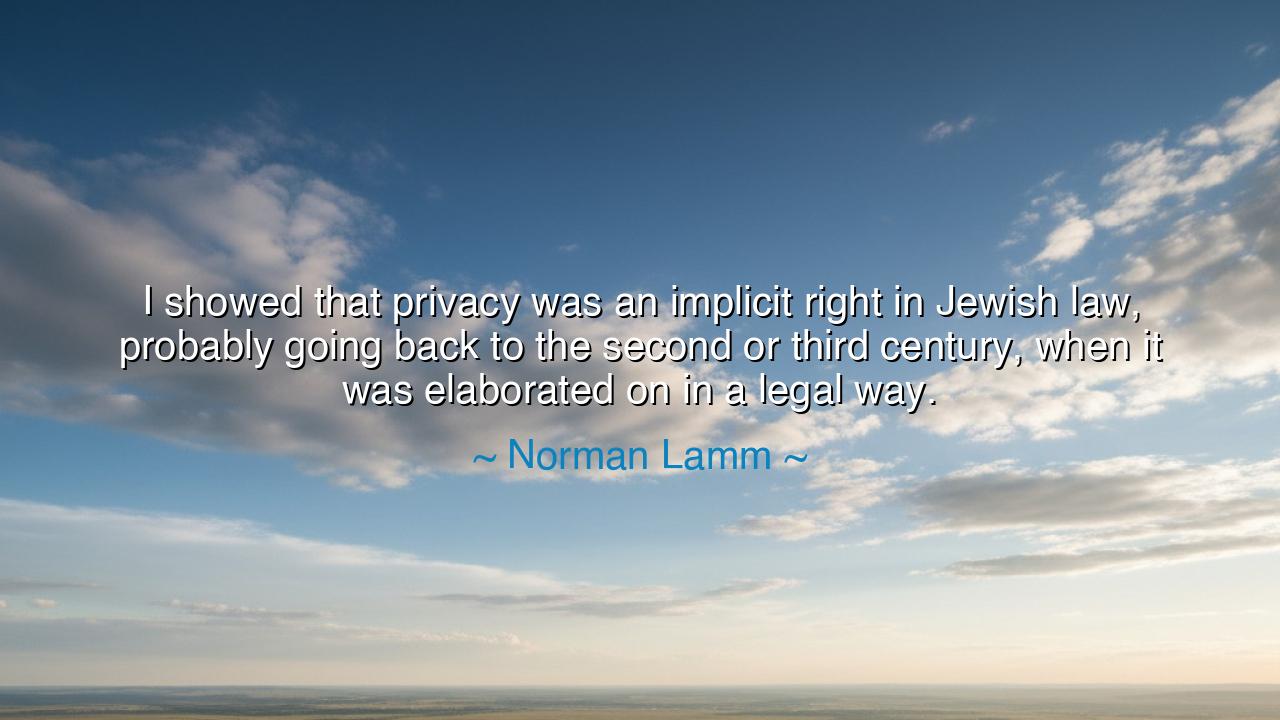
I showed that privacy was an implicit right in Jewish law
I showed that privacy was an implicit right in Jewish law, probably going back to the second or third century, when it was elaborated on in a legal way.






When Norman Lamm said, “I showed that privacy was an implicit right in Jewish law, probably going back to the second or third century, when it was elaborated on in a legal way,” he was not merely tracing a historical thread — he was illuminating a profound truth about the sanctity of the human spirit. In these words lies both scholarship and moral revelation. For Lamm, a rabbi, philosopher, and one of the leading Jewish thinkers of the modern age, privacy was not a luxury of the modern world, but a timeless right, woven into the very fabric of divine law. His statement reminds us that before the rise of constitutions or parliaments, before the codification of human rights in modern legal charters, ancient faiths and moral systems had already discerned that the human soul has a sacred boundary that must not be violated.
The origin of this insight lies in the ancient writings of Halakha, the body of Jewish law that governs both religious and civil life. Lamm’s research revealed that as early as the second and third centuries, rabbis and sages had codified laws protecting a person’s private space, reputation, and inner dignity. This protection went beyond physical intrusion — it was a recognition that every person, being made in the image of God, possesses an inviolable sanctum of self. In an age when kings ruled with unchecked power and privacy was unknown to most, Jewish law already whispered of a higher order: that even the humble were entitled to solitude, confidentiality, and respect for their unseen life.
To understand the depth of this, one must recall the ancient teaching from the Talmud: “He who opens another’s letter violates a trust.” From such principles flowed a river of ethical reasoning that reached into all areas of human conduct. The rabbis forbade entering another’s home without permission, peering into windows, or spreading another’s private words — not merely because such acts were impolite, but because they desecrated the divine spark within. For Lamm, this implicit right to privacy was proof that moral law preceded modern jurisprudence — that the sanctity of the individual was not invented by philosophers, but revealed through faith and cultivated through centuries of reflection.
The ancients understood what many in the modern world have forgotten: that privacy is not simply about hiding what is secret, but about preserving what is sacred. In every person lies a quiet chamber — a place of thought, conscience, and prayer — which must be shielded from the gaze of others. The story of King Saul offers a warning here: when he violated the sacred autonomy of the prophet Samuel, intruding upon what was not his to command, his reign began to unravel. The lesson endures — to trespass upon the inner life of another is to court disorder, for even the smallest invasion of dignity shakes the moral foundations of society.
Lamm’s reflection was not only historical but prophetic. In an age of surveillance, data mining, and constant exposure, his words echo with renewed urgency. He reminds us that the right to privacy is not a mere political issue — it is a spiritual principle, a recognition that the human being is not a public commodity, but a mystery deserving of reverence. The loss of privacy, he would argue, is not only a threat to liberty, but a wound to the soul — for when men and women are stripped of their private selves, they lose the very space where moral thought and divine encounter are born.
There is also a hidden beauty in his choice of words — “implicit right.” He suggests that the greatest truths often dwell beneath the surface of law, not written in ink but inscribed in conscience. This idea recalls the wisdom of Cicero, who said that true law is written “not on parchment, but in the hearts of men.” Lamm’s discovery of privacy within Jewish law is not merely academic; it is a reminder that moral wisdom, like light through stained glass, shines through every age differently, yet springs from one eternal source.
Let the reader learn this lesson well: the sanctity of privacy is the foundation of human dignity. To honor another’s private life — their thoughts, their secrets, their boundaries — is to acknowledge their divine worth. The ancients, though lacking our machines, were wiser than we in this: they knew that the eye must learn restraint, and the ear must practice silence. So guard your own privacy as sacred ground, and respect the unseen world of others as holy. For as Rabbi Lamm taught through his life and his words, freedom begins not in the marketplace or the courtroom, but in the soul’s right to be alone before its Creator.






AAdministratorAdministrator
Welcome, honored guests. Please leave a comment, we will respond soon